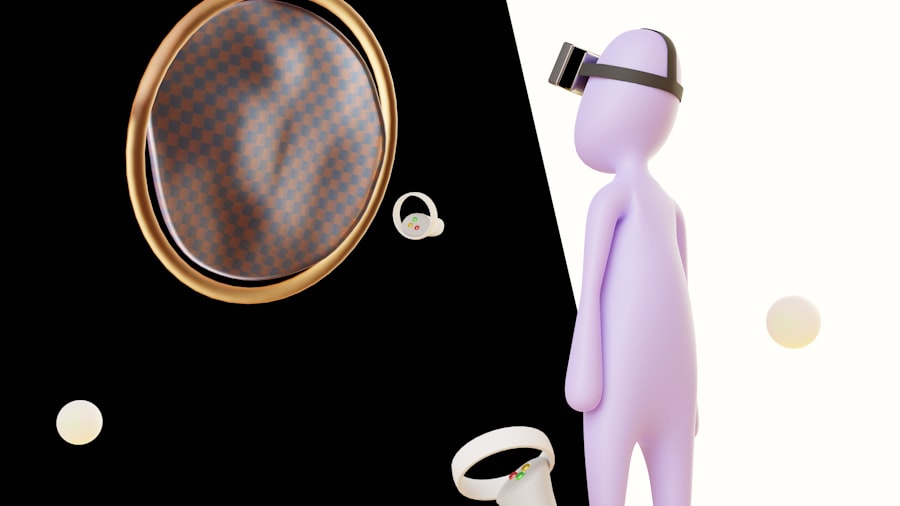Depersonalization-derealization disorder (DPDR) is a dissociative condition that can leave you feeling detached from your own thoughts, feelings, or sense of self. You might experience a sense of unreality regarding your surroundings, as if the world around you is not quite real. This can be a disconcerting experience, often described as feeling like an observer in your own life.
You may find yourself questioning your identity or feeling disconnected from your body, leading to a profound sense of confusion and anxiety. The experience of depersonalization can manifest in various ways. You might feel as though you are watching yourself from outside your body or that your thoughts are not your own.
Derealization, on the other hand, involves a distorted perception of the external world. You may perceive your environment as foggy, dreamlike, or lacking in significance. These experiences can be fleeting or persistent, and they often occur in response to stress or trauma.
Understanding DPDR is crucial for recognizing its impact on your daily life and mental well-being.
Key Takeaways
- Depersonalization Derealization is a mental health condition characterized by feeling detached from oneself and the surrounding environment.
- Symptoms of Depersonalization Derealization include feeling like an outside observer of one’s thoughts and actions, and experiencing a sense of unreality or detachment from the world.
- Psychosis is a mental health condition that involves a loss of contact with reality, often including delusions and hallucinations.
- Symptoms of psychosis may include hallucinations, delusions, disorganized thinking, and difficulty concentrating.
- Key differences between Depersonalization Derealization and Psychosis include the nature of the symptoms and the level of detachment from reality.
Symptoms and Characteristics of Depersonalization Derealization
The symptoms of depersonalization-derealization disorder can vary widely from person to person. One common symptom is a feeling of emotional numbness or detachment from your feelings. You might find it challenging to connect with others or to experience joy in activities that once brought you happiness.
This emotional disconnection can lead to feelings of isolation and loneliness, making it difficult to maintain relationships or engage fully in life. Another characteristic symptom is the sensation of being in a dreamlike state. You may feel as though you are observing your life from a distance, as if you are watching a movie rather than participating in reality.
This can create a sense of confusion and disorientation, making it hard to focus on tasks or make decisions. Additionally, some individuals report physical sensations such as tingling or numbness in their limbs, further contributing to the feeling of disconnection from their bodies. Recognizing these symptoms is essential for understanding how DPDR affects you and for seeking appropriate help.
Understanding Psychosis

Psychosis is a mental health condition characterized by a disconnection from reality. It can manifest in various forms, including hallucinations and delusions. When you experience psychosis, you may perceive things that are not present or hold beliefs that are not based in reality.
This can lead to significant distress and impairment in daily functioning. Understanding psychosis is vital for recognizing its symptoms and seeking appropriate treatment. The onset of psychosis can be sudden or gradual, and it may occur in the context of various mental health disorders, including schizophrenia, bipolar disorder, or severe depression.
During a psychotic episode, you might find it challenging to distinguish between what is real and what is not. This can lead to confusion, fear, and difficulty in managing everyday tasks. Understanding the nature of psychosis can help you identify when you or someone you know may need professional intervention.
Symptoms and Characteristics of Psychosis
| Symptoms and Characteristics of Psychosis | Description |
|---|---|
| Delusions | False beliefs that are not based in reality |
| Hallucinations | Sensory experiences of things that do not exist |
| Disorganized thinking | Difficulty organizing thoughts or connecting ideas |
| Disorganized speech | Speech that is difficult to follow or understand |
| Difficulty concentrating | Struggle to focus or pay attention |
| Emotional disturbances | Fluctuations in mood or emotional expression |
The symptoms of psychosis can be broadly categorized into positive and negative symptoms. Positive symptoms include hallucinations, which are sensory experiences that occur without external stimuli. For instance, you might hear voices that others do not hear or see things that are not there.
These experiences can be frightening and disorienting, leading to increased anxiety and distress. Negative symptoms refer to a decrease in emotional expression or motivation. You may find it challenging to engage with others or express your feelings.
This withdrawal can lead to social isolation and difficulty maintaining relationships. Additionally, cognitive symptoms such as disorganized thinking or difficulty concentrating may arise during psychotic episodes. Recognizing these symptoms is crucial for understanding the impact of psychosis on your life and the lives of those around you.
Key Differences between Depersonalization Derealization and Psychosis
While both depersonalization-derealization disorder and psychosis involve altered perceptions of reality, they are fundamentally different conditions. In DPDR, you may feel detached from yourself or your surroundings, but you typically retain insight into the fact that these experiences are not reflective of reality. You may recognize that you are experiencing a dissociative episode rather than a true break from reality.
In contrast, psychosis often involves a complete loss of insight. When experiencing psychosis, you may genuinely believe in the reality of your hallucinations or delusions, making it difficult to recognize that your perceptions are distorted. This distinction is crucial for understanding how each condition affects your mental state and for determining the appropriate course of treatment.
Causes and Triggers of Depersonalization Derealization and Psychosis

The causes of depersonalization-derealization disorder can be complex and multifaceted. Often, these experiences are linked to trauma or extreme stress. You might find that significant life events, such as the loss of a loved one or exposure to violence, trigger episodes of depersonalization or derealization.
Additionally, anxiety disorders and depression can contribute to the development of DPDR, as they create an environment where dissociation becomes a coping mechanism. Psychosis also has various potential causes, including genetic predisposition, substance abuse, and underlying mental health conditions. Certain drugs, particularly hallucinogens or stimulants, can induce psychotic symptoms in susceptible individuals.
Additionally, severe stress or trauma can trigger psychotic episodes in those with pre-existing vulnerabilities. Understanding these causes can help you identify potential triggers in your own life and seek appropriate support.
Treatment and Management of Depersonalization Derealization and Psychosis
Treatment for depersonalization-derealization disorder often involves psychotherapy as the primary approach. Cognitive-behavioral therapy (CBT) can be particularly effective in helping you understand the thoughts and feelings associated with your experiences.
Mindfulness techniques may also be beneficial in grounding yourself in the present moment. For psychosis, treatment typically involves a combination of medication and therapy. Antipsychotic medications can help alleviate symptoms by addressing chemical imbalances in the brain.
Alongside medication, therapy can provide support in understanding the nature of your experiences and developing coping strategies for managing stressors that may trigger episodes. A comprehensive treatment plan tailored to your specific needs is essential for effective management.
Seeking Help and Support for Depersonalization Derealization and Psychosis
If you find yourself experiencing symptoms of depersonalization-derealization disorder or psychosis, seeking help is crucial for your well-being. You might start by consulting with a mental health professional who specializes in dissociative disorders or psychotic conditions. They can provide an accurate diagnosis and work with you to develop an appropriate treatment plan.
Support from friends and family can also play a vital role in your recovery journey. Sharing your experiences with trusted individuals can help reduce feelings of isolation and provide emotional support during challenging times. Additionally, support groups for individuals experiencing similar conditions can offer a sense of community and understanding as you navigate your mental health journey.
In conclusion, understanding depersonalization-derealization disorder and psychosis is essential for recognizing their impact on your life and seeking appropriate help. By educating yourself about the symptoms, causes, and treatment options available, you empower yourself to take control of your mental health journey and work towards healing and recovery.
Depersonalization-derealization disorder and psychosis are often confused due to their overlapping symptoms, but they are distinct conditions with different underlying mechanisms and treatment approaches. Depersonalization-derealization involves a persistent feeling of being detached from one’s body or surroundings, whereas psychosis is characterized by a loss of contact with reality, often involving delusions or hallucinations. For a deeper understanding of these differences, you can explore an insightful article on the topic by visiting Unplugged Psych. This resource provides a comprehensive overview of both conditions, helping to clarify the nuances that distinguish them.
LEARN MORE About Depersonalization & Derealization
FAQs
What is depersonalization/derealization?
Depersonalization/derealization is a mental health condition characterized by feeling detached from oneself (depersonalization) and feeling detached from the world or surroundings (derealization). It can be a symptom of various mental health disorders, such as anxiety, depression, and trauma-related disorders.
What is psychosis?
Psychosis is a mental health condition characterized by a loss of contact with reality. Symptoms may include hallucinations, delusions, disorganized thinking, and difficulty in understanding reality. Psychosis can be a symptom of various mental health disorders, such as schizophrenia, bipolar disorder, and severe depression.
What are the differences between depersonalization/derealization and psychosis?
Depersonalization/derealization involves feeling detached from oneself and the world, while psychosis involves a loss of contact with reality, often including hallucinations and delusions. Depersonalization/derealization is often a symptom of anxiety and trauma-related disorders, while psychosis is often associated with schizophrenia, bipolar disorder, and severe depression.
Can depersonalization/derealization be mistaken for psychosis?
Yes, depersonalization/derealization can sometimes be mistaken for psychosis, especially if the individual experiencing it is not able to articulate their symptoms clearly. It is important for mental health professionals to conduct a thorough assessment to differentiate between the two conditions.
How are depersonalization/derealization and psychosis treated?
Depersonalization/derealization is often treated with therapy, such as cognitive-behavioral therapy, and sometimes medication. Psychosis is typically treated with antipsychotic medications, therapy, and sometimes hospitalization for severe cases. Treatment for both conditions should be tailored to the individual’s specific symptoms and needs.




